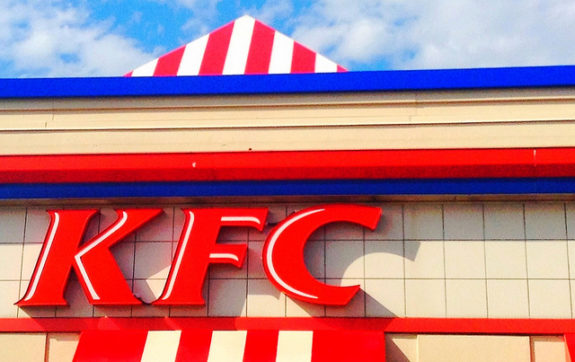
April 10, 2017; Ars Technica
KFC will soon make its signature product healthier and safer for humans, vowing to work with its hundreds of suppliers to eliminate the use of medically important antibiotics in its chickens by the end of 2018.
If parent company Yum! Brands follows through, the restaurant chain formerly known as Kentucky Fried Chicken will join 10 other major food chains in eliminating use of these drugs, bowing to well-orchestrated pressure by prominent advocacy groups such as the NRDC (National Resource Defense Council) in partnership with Center for Science in the Public Interest, Consumers International, Food Animals Concern Trust, and US Public Interest Research Group. The cohort’s savvy multimedia campaign launched in May 2016 employed Auntie Biotic, a sort of white Big Bird covered in pills and videotaped in front of several KFC stores engaged in conversations with consumers about the dangerous impact of the use of medically important antibiotics in animals raised for human consumption. Seventy percent of all such antibiotics (of a kind not normally designed for humans) are administered to livestock and poultry, and their overuse has led to proliferation of strains of antibiotic-resistant bacteria, exposing millions to infections that are hard or impossible to treat. Data suggests that two million Americans annually acquire infections from such superbugs, resulting in 23,000 deaths.
The image-conscious trailblazers enlisted to mitigate the spread of this irascible pandemic include household names such as McDonald’s, Subway, Chick-Fil-A, Chipotle, Wendy’s, Panera Bread, and Taco Bell—the last of which is also a Yum! Brands chain. KFC president Kevin Hochman, who doubles down as the chief concept officer for KFC US, stated in a recent press release that this move is part of his company’s perpetual campaign of self improvement and product development:
Sign up for our free newsletters
Subscribe to NPQ's newsletters to have our top stories delivered directly to your inbox.
By signing up, you agree to our privacy policy and terms of use, and to receive messages from NPQ and our partners.
We’re constantly working to meet the changing preferences of our customers, while ensuring we deliver on the value they expect from KFC. Offering chicken raised without medically important antibiotics is the next step in that journey. Making this change was complex and took a lot of planning. It required close collaboration with more than 2,000 farms, most of them family-owned and managed, in more than a dozen U.S. states where they raise our chickens.
NRDC framed KFC’s decision as a milestone, a “game changer” in addressing a major health concern. According to their food policy advocate, Lena Brook, because of efficiencies, KFC suppliers will likely stop using the antibiotics in the rest of their poultry, which is sold to other companies and reaches consumers through restaurant purchases and grocery stores:
While federal antibiotics policy stagnates, the market is responding to consumer demand for better meat. This commitment from the nation’s most iconic fast food chicken chain will have a major impact on the way the birds are raised in the U.S. and in the fight against the growing epidemic of drug-resistant infections.
KFC’s looming remedial effort comes none too soon to protect its business, which, like all heavily marketed major brands, draws most of its profit from the goodwill with consumers achieved through decades of massive and memorable advertising campaigns. Consequentially, its bottom line is very sensitive to swings in its public image. Last September, the NRDC-led group gave KFC an “F” for its antibiotic practices; now, it commends the franchise for responding positively to its effort to educate the public.—Louis Altman













